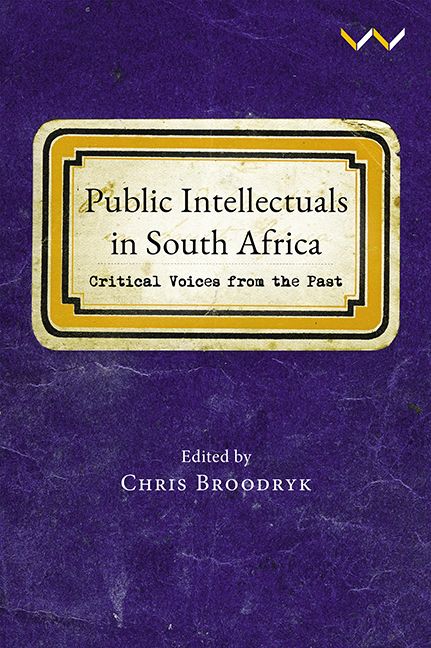Book contents
- Frontmatter
- Contents
- Acknowledgements
- Introduction: The Prismatic Nature of Public Intellectualism
- Chapter 1 Recalibrating the Deep History of Intellectual Thought in the KwaZulu-Natal Region
- Chapter 2 Elijah Makiwane and Early Black South African Public Intellectualism
- Chapter 3 Black Art Criticism in The Bantu World during the 1930s
- Chapter 4 In Conversation with the Nation: Sowetan’s Maverick Editor Aggrey Klaaste
- Chapter 5 William Pretorius and the Public Intellectualism of the Film Critic
- Chapter 6 Cultural Policy and the Arts: Mewa Ramgobin and Public Dialogue
- Chapter 7 ‘Kaalgat Critique’: The Public Intellectualism of Koos Roets as Afrikaans Satirist
- Chapter 8 The Public Intellectualism of Artivist Mandisi Sindo
- Chapter 9 The Janus-Faced Public Intellectual: Dr Thomas Duncan Greenlees at the Institute for Imbecile Children, 1895–1907
- Index
Chapter 5 - William Pretorius and the Public Intellectualism of the FilmCritic
Published online by Cambridge University Press: 16 July 2022
- Frontmatter
- Contents
- Acknowledgements
- Introduction: The Prismatic Nature of Public Intellectualism
- Chapter 1 Recalibrating the Deep History of Intellectual Thought in the KwaZulu-Natal Region
- Chapter 2 Elijah Makiwane and Early Black South African Public Intellectualism
- Chapter 3 Black Art Criticism in The Bantu World during the 1930s
- Chapter 4 In Conversation with the Nation: Sowetan’s Maverick Editor Aggrey Klaaste
- Chapter 5 William Pretorius and the Public Intellectualism of the Film Critic
- Chapter 6 Cultural Policy and the Arts: Mewa Ramgobin and Public Dialogue
- Chapter 7 ‘Kaalgat Critique’: The Public Intellectualism of Koos Roets as Afrikaans Satirist
- Chapter 8 The Public Intellectualism of Artivist Mandisi Sindo
- Chapter 9 The Janus-Faced Public Intellectual: Dr Thomas Duncan Greenlees at the Institute for Imbecile Children, 1895–1907
- Index
Summary
Working in a Pretoria video store as an Afrikaans-speaking teenager in the1990s, I was drawn to movie reviews as a way to access film content. Agerestrictions and distribution issues meant that I was at least temporarilyprohibited from seeing many films and reviews provided valuable knowledgeabout these unseen films. I read movie reviews in two Afrikaans newspapers,the Rapport on Sundays and the Beeld onFridays. On occasion, my father would treat me to the SundayTimes. My exposure to mostly Afrikaans publications in apre-internet era meant that I was familiar with the film criticism of Leonvan Nierop and Barrie Hough, as well as Barry Ronge's writing inEnglish for the Sunday Times (he would eventually publishpieces of non-fiction in a column, later collected in a book titledSpit ‘n Polish). Van Nierop and Hough were bothalso novelists; film criticism was a part of what they did for a living, nottheir solitary endeavour. Hough gained fame for his sensitive Afrikaansnovels for young adults, while Van Nierop wrote popular thrillers and radiodramas, as well as appearing regularly on television and radio to speakabout new film releases.
As generally informative as these reviews were, the Afrikaans film critic whomost informed my own thinking about film, and specifically film andpolitics, was William Pretorius. While I initially read Pretorius'swriting in Afrikaans in the Beeld, I later discoveredexactly how prolific he had been, as he had published regularly in theEnglish print (and later online) media and occasionally in academiccontexts. Pretorius occupied a dual position: he was academically active andinvolved in teaching film, but also aired his views on film for non-academicfilm-going readers in popular print and online publications. His moviereviews demonstrated his propensities and concerns, which were communicatedto a readership who sought out his voice among other critics for apolitically committed, cine-literate film criticism.
As this chapter shows, Pretorius's political commitment isdemonstrated in how he consistently foregrounded a film'ssociopolitical contextual concerns; he was cinematically informed because hewatched and referred to films outside of the Hollywood classical narrativeand promoted these films in his criticism.
- Type
- Chapter
- Information
- Public Intellectuals in South AfricaCritical Voices from the Past, pp. 108 - 128Publisher: Wits University PressPrint publication year: 2021



